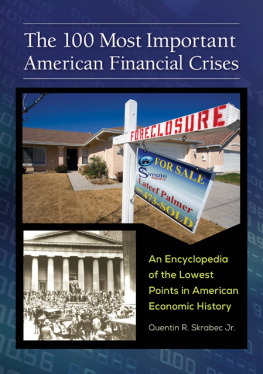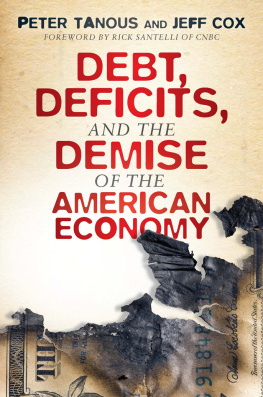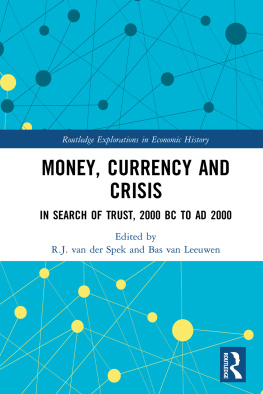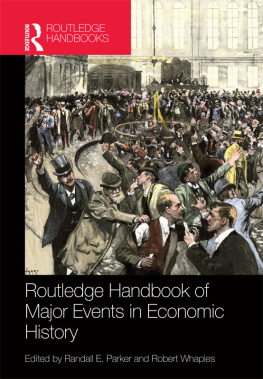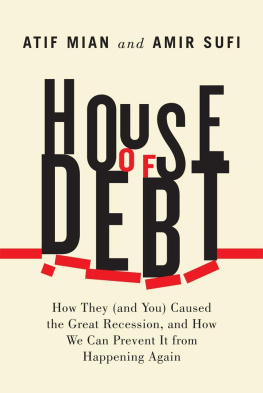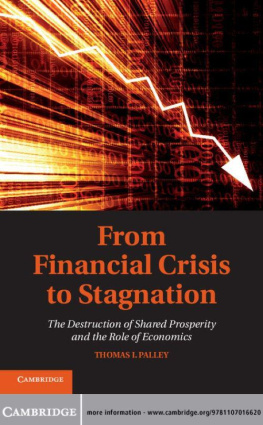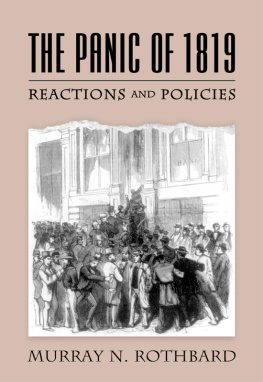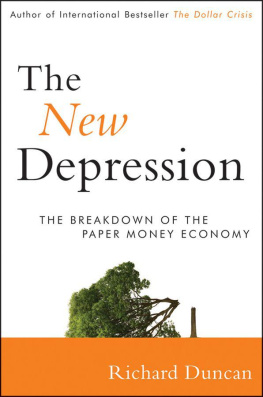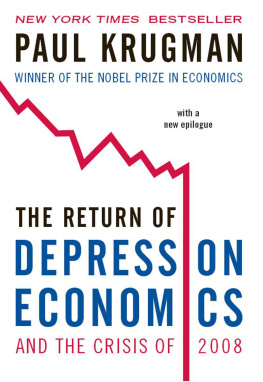

Copyright 2015 by ABC-CLIO, LLC
All rights reserved. No part of this publication may be reproduced, stored in a retrieval system, or transmitted, in any form or by any means, electronic, mechanical, photocopying, recording, or otherwise, except for the inclusion of brief quotations in a review, without prior permission in writing from the publisher.
Library of Congress Cataloging-in-Publication Data
Skrabec, Quentin R.
The 100 most important American financial crises : an encyclopedia of the lowest points in American economic history / Quentin R. Skrabec Jr.
pages cm
Includes bibliographical references and index.
ISBN 978-1-4408-3011-2 (hardback : alk. paper) ISBN 978-1-4408-3012-9 (ebook) 1. Financial crisesUnited StatesHistory. 2. United StatesEconomic conditions. 3. Banks and bankingUnited StatesHistory. I. Title. II. Title: The hundred most important American financial crises.
HB3722.S58 2015
338.5'42dc23 2014022053
ISBN: 978-1-4408-3011-2
EISBN: 978-1-4408-3012-9
19 18 17 16 15 1 2 3 4 5
This book is also available on the World Wide Web as an eBook.
Visit www.abc-clio.com for details.
Greenwood
An Imprint of ABC-CLIO, LLC
ABC-CLIO, LLC
130 Cremona Drive, P.O. Box 1911
Santa Barbara, California 93116-1911
This book is printed on acid-free paper 
Manufactured in the United States of America
To the Patroness of American Crisis, Our Lady of Prompt Succor
Contents
Appendix: Primary Documents
Preface
T his book is the work of more than 30 years of researching and writing about a literary pantheon of great American capitalists. Through this work it became clear that many of these great capitalists were defined by crisis. In addition, it became clear that current business law is largely a response to times of crisis in our nations history. In forming the list of financial crises explored in this book, I tried to use economic costs as a guide where possible. Many economic crises, such as deindustrialization, free trade, and the collapse of the steel, rubber, and auto industries, left personal scares, some of which have given me more insight than my many degrees. As a businessman, I have an advantage over an economist in writing this book because, in the end, economic disasters are more about people than costs. A businessman has a better perspective on events that start with little economic cost but grow to have a major impact on the nations business. The arrival of Japanese cars in 1965, for example, was at the time a nonevent but would change the lives of many Americans in the decades to follow. I hope that taking such a perspective will help future students and reporters assess the economic impact of future events. For example, by studying what happened when Japanese cars arrived in America we might know what to expect when the first shipment of Chinese cars reaches our shores. By reading about other events described in this book, investors might be able to better evaluate the economic effects of hurricanes, material shortages, fuel shortages, and flu epidemics, or insect invasions.
The real challenge in writing this book was selecting the 100 key economic events. First of all, the scope of the events had to be determined: some of them were regional, others were national, but all had national repercussions. Second, the timing of the events was also important. For many events, such as the Mont Pelerin summit after World War II, the impact was not seen for a decade or more. Other events, such as deindustrialization or the collapse of a specific industry, were more of a process than an event. The list changed as research and writing progressed. Initially, selecting 100 specific events seemed too broad, but by the end I felt that choosing only 100 events meant I had to leave out some significant events. My focus was to ensure that the 100 economic events selected all truly belonged. Im sure that others might have a slightly different list, but this list reflects most of our nations economic disasters.
Acknowledgments
I was blessed with four of the countrys best archival staffs at the Library of Congress, the Smithsonian, the Senator John Heinz History Center, and the Benson Research Center at the Henry Ford. At the Heinz Center, I had the expertise of Lisa Lazar, Lauren Paige Zabelsky, and Art Louderback as well as the entire staff. In addition, I would like to thank Terri Blanchette, Sandra Baker, and Rob Ridgeway of the Heinz History Center in Pittsburgh. At the Henry Ford Benson Research Center, I had the outstanding assistance of Carol Whittaker and Kira Macyda and the whole staff at the Benson Research Center. I would like to thank the staff at the Carnegie Library of Pittsburgh as well. Reference librarians are often the forgotten people behind a successful book, and at the University of Findlay, Rebecca Quintus and all of the Findlay library staff. At the Bentley Historical Library, where I found a new source of research in their archives, I would like to thank Malgosia Myc and all the staff of this outstanding library.
I would like to especially thank Alesha Shumar, archivist at the University of Pittsburgh, Wendy Pfleg of the University of Pittsburgh, and Barry Ched and Gil Pietrzak of the Carnegie Library of Oakland. Thanks also to Julie Ludwig, associate archivist of the Frick Collection (New York), and Greg Langel of the Frick Center in Pittsburgh. I would like to give special thanks to Julie McMasters of the Toledo Museum of Art and Kimberly Brownie, Ann Bowers, and Barbara Floyd of the Ward M. Canaday Center at the University of Toledo. I would particularly like to credit the help and vast knowledge of Janet Metzger at the William McKinley Presidential Library and Museum. The staffs at both the Canton and Niles presidential memorials are outstanding sources of 19th-century industrial America. The Clement Library of American History at the University of Michigan was another important reference library, which I consulted for this work. Another important facet of the search was done at the Hayes Presidential Center archives, where I would like to thank Nan Card, chief archivist, and Merv Nall.
Introduction
T his encyclopedia covers 100 of Americas lowest economic points from 1620 to the present. The selection of these economic problems was not as easy as it might first appear. The arbitrary limit of 100 gives a very broad list covering the economic impact of events not normally studied for their economic impact. The events, whether they originated domestically or internationally, were chosen based on their impact on the American economy. All of these economic and financial low points are American, but they range from large regional problems to national and international bubbles, recession, shortages, embargos, natural disasters, and depressions.
Because of interconnections in todays economy, local disasters are more likely to have a financial impact on the whole nation. Judging by the huge economic impacts of the terrorist attacks on the World Trade Center in 2001 and Hurricane Katrina in 2005, the San Francisco Earthquake of 1906 would have had much farther-reaching economic effects if it had happened in todays integrated economy. America has known many natural disasters and hurricanes, but the decision as to which to include as financial disasters depended on whether they had a national effect on the economy. Hurricanes Katrina, Sandy, and Andrew all made the list because of their national impact. The interconnectivity of the international banking field has similarly increased the impact of any crisis on Americas economy. This was seen in such events as the Mexican Pesos Crisis of 1994, the 1997 Asian Crisis, and the Russian Crisis of 1998.
Next page
